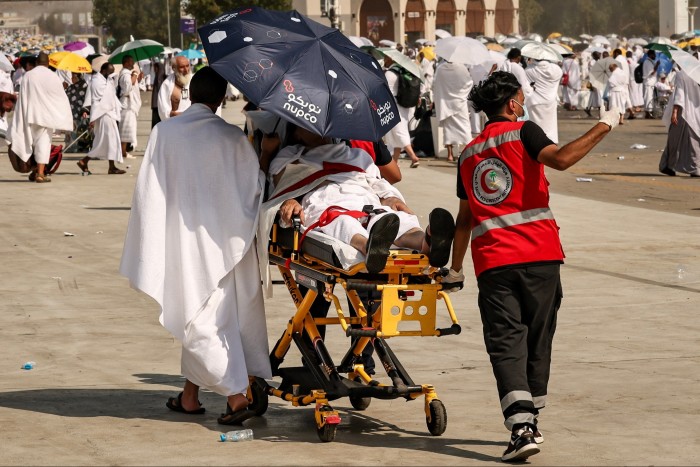
Stay informed with free updates
Simply sign up to the Middle Eastern politics & society myFT Digest — delivered directly to your inbox.
Extreme temperatures in the Muslim holy city of Mecca have seen 1,301 people die during this year’s hajj pilgrimage, a senior Saudi official said.
Health minister Fahad al-Jalajel said on Sunday that 83 per cent of the dead were unauthorised pilgrims who had walked long distances under direct sunlight without shelter or rest, including elderly people and some suffering from chronic illnesses.
Saudi authorities have issued multiple warnings against attempting to perform the hajj without authorisation in the weeks leading up to the pilgrimage earlier this month. They also advised pilgrims to take precautions against the expected hot weather at the holy sites.
However, many people managed to evade security checkpoints around Mecca and reach the city, including hundreds from Egypt. Without authorisation, those people had no access to basic services or proper accommodation to deal with the heat as temperatures rose to nearly 50°C.
“We consider pilgrims as pilgrims the moment they dress for hajj, regardless of the status of their authorisation, colour, gender or nationality. They receive full [healthcare] services,” the health minister told state television on Sunday. He said a quarter of those services had been deployed to help unauthorised pilgrims.
Egyptian prime minister Mostafa Madbouly said on Friday that travel companies that had facilitated journeys for the unregistered pilgrims who died would be investigated.
“Investigations will be launched into any company which organised the travel of the pilgrims who died outside of regular frameworks . . . and did not provide them with logistical support,” he said, threatening “strong decisions and the severest punishment” to avoid a repetition.

Around 1.8mn people went on the hajj this year, Saudi authorities said. With many of them elderly or travelling with pre-existing health conditions, deaths are not uncommon during the five-day pilgrimage. But this year’s figures were seen as high compared with previous years free of major incidents such as stampedes or fires.
Pilgrims need a specific type of visa to access Mecca during the hajj. The documentation is allocated to countries on a quota system based on the size of their Muslim populations. But the high cost of the pilgrimage and the long waiting list in some countries leads many to travel outside the official system.
The timing of the hajj is determined by the Islamic Hijri calendar. This is based on the lunar cycle so the hajj shifts forward by around 11 days each year on the Gregorian calendar used in the west. Pilgrims can expect to be able to perform the rituals in milder weather conditions for several years after 2030 as the hajj season then falls in the winter.
Additional report by Heba Saleh in Cairo